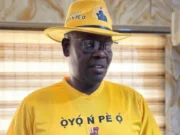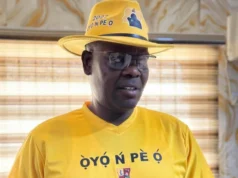In 2019, many people picture Governor Seyi Makinde as a Messiah. Like the king with the Midas touch. They saw in his aspiration solutions to their problems, answers to their prayers. To civil servants, prompt salary payment became their prayer point. To students, many of whom had to bear Senator Abiola Ajimobi’s imposed levy, the lure of free education charmed them, admiring the Governor’s audacious and ambitious vision to spread education across the state.
The ordinary folk on the street sees Makinde’s emergence as the start of a new era, an end to the jinx breaker. His calmness and introverted ideals endeared him to the people. Prominent opposition figures including former Governor Rashidi Ladoja threw their weight behind him thinking the time to rejoice had come – for a quiet and reserved person hardly reneges on his words. Or so they thought.
Admittedly, Governor Seyi Makinde’s electoral victory came as a huge relief, a soothing balm to state civil servants. In part because the various draconian policies embarked upon by Senator Abiola Ajimobi’s government had toughened most people’s life. Under Ajimobi for instance, subvention to the schools plummeted while most workers struggled with inconsistent wages. More than any other candidates, Governor Seyi Makinde’s promise of a better deal struck a chord and sends hope coursing through most civil servants’ veins.
Unfortunately, the events of the past few months where most state-owned higher institutions of learning have remained shut, groaning under locks and keys tear one’s heart to shred . With classrooms closed, most students wandered at home; hoping the impasse would quickly pass. In a similar vein, most affected workers are now scampering for survival, sourcing for livelihood elsewhere. Indeed, the untold story of tertiary institutions staff under Governor Seyi Makinde is a reminder of the dark old days of half salary and hostile working environment.
In essence, the foray of the likes of Governor Seyi Makinde into the murky water of politics was seen as critical to democratic survival at the sub-national level: when successful business people leave the comfort and luxury of their predicted environment for exciting and adventurous exploration, their ability to breathe fresh air into the public service and change the narrative can never be doubted. At least, when GSM joined politics, people believed his personality starkly contrasted from the man he succeeded – and from those of career politicians.
He was by far a complete departure from the outspoken, extroverted Senator Isiaka Abiola Ajimobi’s regime. Compare to other candidates, he was the voice people loved to hear, the face they admired to see, the only man that deserved their votes – Omituntun – Dawn of the New era. But with the incessant industrial actions embarked upon by the Joint Action committee of trade unions (ASUP, COEASU, SSANIP, AND SSUCOEN) in EACOED, Oyo, TOPS, Saki, AOP, Eruwa, COE, Lanlate, and OYSCATECH, Igboora, come the flurry of dramatic change in the usual songs of praise. With Governor’s lovers and admirers rethinking their overt and overt support as the next election beckons.
Despite the underwhelming performance of the government in certain critical areas – the handling of crisis rocking state-owned tertiary institutions as a test case; the noise coming from the Governor’s lickspittle has remained unabated, disturbing and disrupting civil conversations around issues of policy thrust.
In fact, the hordes of internet bootlickers now firmly believe that independent critics of the government are members of the opposition party. But now, as the winds of reality quietly blow over the veil of deception, the era of noise and propaganda seems to be drawing to a close. Of course, the story is the same on all fronts. The coalition that combined energy and synergy to clinch victory at the poll has dissolved. The streetlights that gulped billions of naira are hibernation in most of the rural areas, the youths trained under YEAP as still salivating, and religious divides have widened.
“What are the issues they are talking about?” Governor Seyi Makinde interjected in one of his interventions on the lingering issue that has defied all solutions “they were saying they don’t want Platinum consultants and other things. But we had to resort to hiring consultants because of their transactions”. Speaking through Chief Press Secretary (CPS) Taiwo Adisa, “the governor resorted to hiring consultants because financial activities in the institutions were opaque and that the institutions were not ready to embrace transparency in their transactions”.
The Joint Action Committee on the other hand countered the Governor’s claim saying “the operations of the consultant as an authorization body for all spending is not only a serious aberration but also giving the institutions unnecessary bottlenecks”. In addition, the statement continued “the operations of platinum approving all payment are not supported by existing edict”. Given the argument advanced by the Governor and the counterargument of the trade unions, it is evident the bone of contention is one of legality and authority.
The governor being the visitor to those schools appears displeased with the ways transactions are handled and as such decides to set the record straight. The policy thrust on the union leaders appears encroaching, stripping the management of their autonomy and freedom to run the school without the undue interference of outsiders.
“Workers in Oyo state-owned tertiary institutions saw Makinde as a welcome relief” a senior lecturer who pleaded anonymity told me in one of our interviews “that he instituted Platinum to block financial leakage in those institutions.
Unfortunately, the man in charge of the Platform lord it over the management team and conduct their affairs like an Emperor addressing (Provosts, Rectors) as class representatives”. The consultancy, he continued, is entitled to 10% of monthly revenue accrued to the purse of each institution. Appeal letter has to be forwarded to the platinum for proposed expenditure on the procurement of stationeries, exam materials, and diesel to power generating sets all which slow down activities in those institutions. Funny enough, he summed up; the man will not approve in time.
When legality and authority clash as the case here, students greatly suffer. When two elephants fight, the grass suffer. At a decisive moment like this is the simple but equally powerful question about this agency that’s now known for wrestling money and authority with school management: who owns Platinum Consultants? The Governor’s brother-in-law as it’s in some quarters or a prominent politician interested in milking the institutions at the detriment of their development?
OYO101 is Muftau Gbadegesin’s Opinion about Issues affecting Oyo state, published on Saturdays. He can be reached via muftaugbadegesin@gmail.com and 09065176850



































